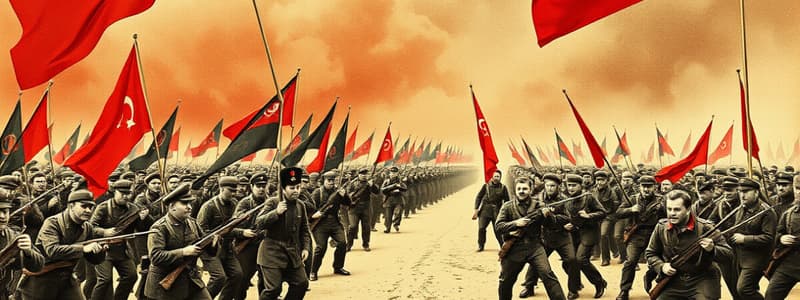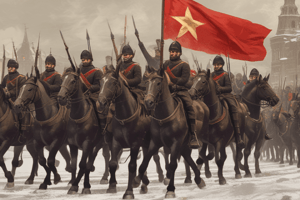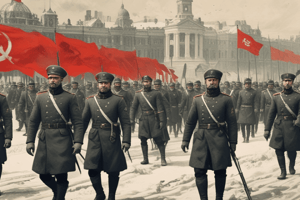Podcast
Questions and Answers
What is the system in which a government controls the distribution of land and resources known as?
What is the system in which a government controls the distribution of land and resources known as?
Communism
Flashcards are hidden until you start studying
Study Notes
Civil War and Power Struggle
- A civil war lasting three years ensued following the Bolshevik rise to power in early 1900s Russia.
- The tsar and his family fled to Germany as a result of the political turmoil.
- The Treaty of Brest-Litovsk became disregarded as the fight for power escalated.
- The White Army surprisingly declared support for the Bolsheviks during this chaotic period.
February Revolution Response
- Many soldiers stationed away during World War I responded to the February Revolution by joining riots instead of maintaining order.
- Remaining soldiers did not attempt to restore order and instead participated in the unrest.
Communism Emergence
- Communism was established in Russia post-1917, characterized by government control over land and resource distribution.
Causes of the Russian Revolution
- Key causes include a large, restless middle class and the existence of an autocratic monarchy.
- Contrary to popular belief, battlefield victories in World War I did not contribute to the revolution.
Bolshevik Objectives
- The Bolsheviks aimed to establish a new socialist government in Russia, opposed to supporting the provisional government or restoring the tsar.
Russian Army During WWI
- The Russian army was large but ill-prepared for World War I, facing significant challenges on the battlefield.
Vladimir Lenin's Role
- Vladimir Lenin emerged as a significant leader of the Bolsheviks, instrumental in the revolution and establishment of the new government.
1905 Citizen March
- In 1905, thousands marched in St. Petersburg demanding better working conditions, more personal freedoms, and improved government representation.
Tsar's Public Interaction
- The Russian tsar had minimal contact with the populace, being largely removed and rarely seen, contrasting with interactive leadership styles.
Studying That Suits You
Use AI to generate personalized quizzes and flashcards to suit your learning preferences.




